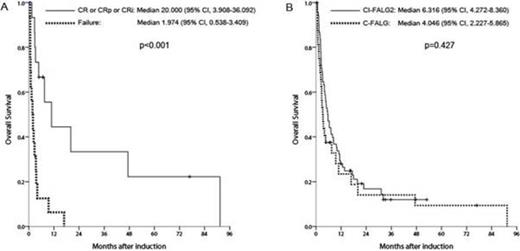Abstract
Relapsed/refractory acute myeloid leukemia (R/R AML) is hard to treat especially in elderly patients. We previously assessed continuous infusion (CI) of fludarabine and cytarabine plus idarubicin (CI-FLAG2) for patients under 65-years old with R/R AML. Also we started prospective phase II study of attenuated version of CI-FLAG2 for elderly patients (C-FLAG). R/R AML in elderly (¡Ã60 years old) patients were eligible. Induction chemotherapy consisted fludarabine and cytarabine (ARAC) as a 24-hr CI without idarubicin. Total 38 and 68 patients were enrolled in CI-FLAG1 and CI-FLAG2, respectively. There were no differences in terms of patients’ characteristics except for median age (p<0.001), HCT prior to salvage (p=0.002), WBC>20K/uL at salvage (p=0.004) and PB blast>40% at salvage, all which factors were unfavorable in C-FLAG. When comparing outcomes between CI-FLAG2 and C-FLAG, there were no difference in terms of CR rate (p=0.572) and objective response rate (ORR; p=0.899). Treatment failure patterns were also similar between C-FLAG and CI-FLAG2 (p=0.742). The most common treatment failure was resistant (66.7%) in C-FLAG. There were more frequent HCT in CI-FLAG2 (p<0.001) and consolidation chemotherapy in C-FALG (p=0.001). Poor predictors on ORR in C-FLAG were PB WBC>20K/uL at salvage (p=0.024) and PB blast >0% on early evaluation (p=0.013) by multivariate analysis. The overall survival of patients who achieve CR/CRp/CRi showed significantly prolonged survival compared with patients who did not in C-CLAG (p<0.001; Figure 1A). The median overall survivals were similar between CI-FLAG2 and C-FALG (p=0.427; Figure 1B).
Figure 1
Overall survival
Attenuated salvage regimen C-FALG in elderly patients was as effective as more intensive younger patients’ regimen CI-FALG2 in terms of response and survival although elderly patients had more unfavorable clinical characteristics.
Disclosures:
No relevant conflicts of interest to declare.
Author notes
*
Asterisk with author names denotes non-ASH members.
© 2013 by The American Society of Hematology
2013


This feature is available to Subscribers Only
Sign In or Create an Account Close Modal